Keri Wyatt Kent's Blog, page 7
March 3, 2021
A simple path from scarcity to abundance

One in a series of occasional reflections on Lent.
Traditionally, Lent is a season of preparation for Easter. But what does that mean, to prepare for Easter?
Maybe you’re not even sure about whether you’ll be able to participate in Easter’s traditions: going to church, singing, gathering around a table with family and friends. Planning in a pandemic is fraught, isn’t it?
What if our uncertainty about Easter Sunday could redirect our focus now, in the weeks leading up to that day?
Easter celebrates the resurrection of Jesus. Depending on how things go, we may or may not be able to celebrate with others in the way we used to. For the second year in a row, Easter may look different.
Yet right now, aren’t you longing for resurrection? For rebirth, for miracles? You don’t have to find things to give up in order to create a somber prelude to the joyful chorus of “He is Risen!” You’re living it.

You’re longing for hopeful news, for renewal, for a fresh start. Maybe Lent is a time to live with that longing, to grieve the things you’ve lost in the last year, to be honest about the pain and loss. To not rush the lament.
A simple path forward
That being said, grief is not a destination but a process. We need tools to help move us forward, toward resurrection and rebirth. When we acknowledge the pain, we can begin to move out of it.
In many faith traditions, Lent focuses on three practices: prayer, fasting and almsgiving. Jesus taught on these three practices, and his teaching is recorded in Matthew 6.
Jesus begins this teaching by warning his listeners to not brag or broadcast their “righteousness” or good deeds, but to do them quietly. His invitation offers a simple path from scarcity to abundance, from fear to faith.
“Be careful not to practice your righteousness in front of others to be seen by them. If you do, you will have no reward from your Father in heaven.” (Matthew 6: 1)
These quiet practices are exactly what we need to prepare for Resurrection Sunday.
Jesus begins with a call to generosity without fanfare.
2 “So when you give to the needy, do not announce it with trumpets, as the hypocrites do in the synagogues and on the streets, to be honored by others. Truly I tell you, they have received their reward in full. 3 But when you give to the needy, do not let your left hand know what your right hand is doing, 4 so that your giving may be in secret. Then your Father, who sees what is done in secret, will reward you.” (Matthew 6:2-4)
Generosity is a practice that meets the practical needs of the recipient, but also transforms the giver. By being generous, we become more generous. We grow our faith as we see that God provides through us and for us. What does it look like to be radically generous, not just with stuff, but with grace? And what happens to our hearts, and our connection with God, when we do so?

Generosity during times like this is hard. We get stuck in a scarcity mindset, focusing on all we don’t have or can’t do. How can we shift from scarcity to abundance?
It’s easy to assume we need to somehow develop an abundance mindset first, in order to be generous. But that’s not how it works. It is the very daring act of generosity that transforms our mindset from scarcity to abundance. When we give grace, grace abounds more in us.
Opportunities to give are more abundant than ever this year, as more families have become food insecure and gap between those who have and those who do not continues to widen.
What would it look like for you to give to someone in need this Lent? It doesn’t have to be a financial gift—although of course it can be. A lot of people are in desperate need right now and a gift may be just what is needed. Maybe you’ll bring groceries to a family you know is struggling. Maybe you’ll drop off a meal for a friend who is sick or has lost a loved one. Maybe you’ll just listen to someone who is overwhelmed by their own grief and loss this year. Or send a note of encouragement to a friend. Just taking time for a simple act of generosity can help us loosen the grip that scarcity has on our souls.

It’s easy to think that giving will be something that depletes us. But the miraculous thing about generosity, especially when we do it anonymously or quietly, is that it fills us up. It allows us to both extend and experience God’s love.
In my book GodSpace, I write: “God calls us to be generous not for generosity’s sake, but for the sake of relationship. Whether we are generous with time, money, forgiveness, or grace, we do so in the context of relationship. It is how God loves us—lavishly—and calls us to love others. …Jesus called us to radical generosity, asking us to love extravagantly and indiscriminately.”

How do you sense God is inviting you into generosity today? How can you make giving part of your Lenten practice?
The post A simple path from scarcity to abundance appeared first on Keri Wyatt Kent.
February 25, 2021
What are you longing for this Lent?

I went for a run this week in the woods. The subzero weather has abated, and things are beginning to melt. But the path shaded by tall, bare trees remains hidden from sunlight, and still snow-packed. A narrow swath of the path, where people had walked or skied, was hard and icy. The margins were uneven, mushy snow that you sank in like mud.

I tried to run in the softer, wet snow. After just a few slogging steps, I switched strategies, and chose the hard and icy, hoping the treads on my trail shoes would get me through. Each step was uncertain and included a bit of sliding. Not a lot, just enough that I was unsteady, and after three miles, my legs were much more spent than they normally would be.
Sometimes our spiritual practices are kind of like running on a melting but still icy trail. Progress happens, but slowly. It isn’t pretty. It’s uncomfortable. But we press on, fueled by our desire for God.
As we continue on through Lent, what practices are you engaging in? What have you given up, what have you added? How is that going? What are you longing for this Lent?
Maybe Lent is a time to embrace the imperfect. I had a great conversation recently about the practice of Sabbath, and also this idea of longing for God, with my friend Angie Baughman, on her vodcast (yes, that’s a video podcast) Steady On Stronger Together. We talked about my books Rest and GodSpace, and what it means to practice Sabbath.
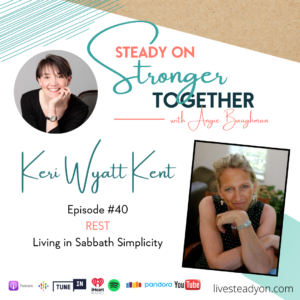
As the pandemic wears on, Sabbath may seem less relevant. When you’re at home all the time anyway, the days blur together and being intentional about setting a day apart to rest might feel like forging a path through mushy snow.
But in this season, where everyone is home for work, school and maybe a little too much togetherness, don’t we need a day set apart? A day where our attention is turned to something other than our obligations? (Angie, our friend Scarlett and I talked about this and much more on the vodcast so check it out!)
In this relentless season, when trying to make progress feels like running on ice, could Sabbath be a life-giving practice for you? And what does a Sabbath practice look like during a pandemic?
You can both listen and watch our conversation on Angie’s website, Steady On. She’s got a ton of great content including Bible studies, a virtual book club and more. Click here to check it out.
What path are you walking this Lenten season? What practices are sustaining you? What have you let go of in order to make more space for God in this season? Where are you longing for rest?
The post What are you longing for this Lent? appeared first on Keri Wyatt Kent.
February 17, 2021
Lead with your ears

Today we begin our 2021 Lenten series. Let’s talk about this, the strangest Lenten season ever, and walk through it together. What practices do you want to engage? What do you want to let go of to make space in your life?
The practice of silence is powerful. Quieted, our souls settle. Often, silence is a practice combined with solitude: spending time alone for the purpose of reflection and connection. In other words, time alone with just you and God.
Trapped inside by the pandemic and freezing cold almost everywhere, we might be craving solitude or sick to death of it, depending on our circumstances.
But what if we practiced silence when we’re with people? Not by giving them the silent treatment, as tempting as that might be. But just by practicing quietness, choosing to listen instead of speak? What if I gave up interrupting, or needing to be right? I’m not afraid to speak my mind, but sometimes, it would be best to sit, wait, and listen.

This has been a tough season, in which little has been normal. And then on top of it this week, most of the country has had to experience what we in the Midwest call “normal winter.” Life is harder when it’s cold out, and it’s cold out everywhere this week.
When I’m stressed, I want to argue about it. I want to complain. Jodie left a comment on yesterday’s post about giving up complaining for Lent, which is brilliant, but not easy. She inspired me to weigh my words. To look for beauty in the midst of struggle. I was full of good intentions. I made myself wade through snow over my knees to find a bit of beauty in my backyard garden, and thought–I can do this.
Of course, then, life happened. A word of criticism sparked defensiveness and anger. The silence that ensued was not life-giving or reflective.
What practice do I need to engage in this Lenten season? The answer that bubbles up is grace. I need to give copious amounts of grace to others, and to myself. And it seems the path to grace begins with silence—not silent withdrawal, but silent attention. In other words, listening.

Photo by Aaron Burden from StockSnap
The Bible’s wisdom reminds us to be slow to speak, quick to listen, and slow to become angry. The Message translation offers this fresh take: “Lead with your ears, follow up with your tongue, and let anger straggle along in the rear. God’s righteousness doesn’t grow from human anger.” (James 1:19, MSG)
“Righteousness doesn’t grow from anger.” Well, of course. As obvious as that is, it’s hard to put into practice.
This Lent, I want to lead with my ears.
How about you?
The post Lead with your ears appeared first on Keri Wyatt Kent.
February 15, 2021
How has the pandemic formed you?

On a Zoom call with my long-time running buddy Maryam this morning, the day in between her birthday and mine, we looked back at a year. Would we have imagined a year like the one we’ve lived through since our birthdays last year?
How has this pandemic year changed us, changed our children? Our work, friendships, emotional health? Certainly any of us would say we have been formed, molded, influenced, even transformed by this year of uncertainty. We have been changed, and as a result, we see the world differently.
For many, the changes have impacted physical health, emotional well-being, financial or job status. In other words, who we are and who we are becoming. They are a part of our spirits, who we are at the very core.
Dallas Willard wrote:
“Sp[image error]iritual formation, without regard to any specific religious context or traditions, is the process by which the human spirit or will is given a definite ‘form’ or character. It is a process that happens to everyone. The most despicable as well as the most admirable of persons have had a spiritual formation. Terrorists as well as saints are the outcome of a spiritual formation. Their spirits or hearts have been formed. Period.” (Renovation of the Heart)
It is a process that happens to everyone. And certainly, it can happen with little attention or intention on our part. Or it can be something we’re deliberate about.

Photo by Matt Moloney from StockSnap
Months of lockdowns, unemployment, uncertainty, seeing a rising death toll once unimaginable—these realities have formed our spirits.
Fear perhaps occupies more space in our hearts than it did before—and that forms us. Fatigue crowds our souls—and that forms us. Anger flames up, whether over politics, kids, partners—and that forms us too. Perhaps these crowd out faith more readily than before. None of us set out to become more fearful or less faithful, more angry or just plain tired, but…sometimes, pandemics happen.
We can do hard things
I’m a person who loves to plan. The pandemic has shattered my illusions of control—I can make plans but you don’t always know what will happen. Lots of plans have been sidelined, delayed, changed.
While I’m sure you are as frustrated by this and thousand other struggles as I am—and yet, the struggles of this pandemic season have shaped you. If anyone had told you a year ago you would survive a year of this, you might not have believed them. Sure, you’re tired, but you’ve endured. As Glennon Doyle says, We can do hard things. And even if we are not really focused or aware of our formation, doing hard things makes us stronger. Which means you might be becoming more of a badass just by surviving.
Over the last year, I’ve found myself returning again and again to the Serenity Prayer, a linchpin of the recovery movement, originally composed by pastor and theologian Reinhold Niebuhr in the early 1930’s:

Photo by Ben White from StockSnap
Lord,
Grant me the serenity
to accept the things I cannot change,
The courage to change the things I can,
And the wisdom to know the difference.
While that opening line is most often quoted, the rest of the prayer is not as easy to pray. It invites us to do hard things, and to be formed. To be intentional about our own formation, rather than just letting it happen.
Living one day at a time;
Enjoying one moment at a time;
Accepting hardships as the pathway to peace;
Taking, as He did, this sinful world
As it is, not as I would have it;
Trusting that He will make things right
If I surrender to His Will;
So that I may be reasonably happy in this life
And supremely happy with Him
Forever and ever in the next.
Amen.
This year has forced us to live one day at a time, not knowing what each day or week will bring. What has gotten me through a lot of it is choosing to do what I can—which has included running. Small choices—get out of bed, gulp some coffee, head for the trails—made one after the other, day after day. My spirit has been formed this year by choosing to get outside (safe and socially distanced) to run. There are things I cannot change but I can put one foot in front of the other, on a trail or a road, to find a moment of freedom (and endorphins).

By doing something that can be hard (running), I grow in my ability to do other hard things. By accomplishing a few miles, I come to believe that I can get through the rest of the day. And to believe that these hard things are indeed a pathway to peace. We don’t drift into positive change. It requires intention.
What would happen to my spirit if I could “Accept hardships as the pathway to peace”? We want to be peaceful and happy, but according to this time-tested wisdom, those results, that formation, happens when we surrender, accept hardship, and perhaps revise our expectations. What if that surrender will form our spirits, not into a hardened fist of fear, but to an open hand of receiving good gifts?
What if, as you begin the second year of living in the age of Covid, you could decide to embrace serenity, by doing hard things? By accepting and embracing the challenge of hard things? And in so doing, embark on an opportunity to have your spirit formed into a new shape?
What if you were to shift from unintentional spiritual formation (more angry, fearful and fatigued) to intentional formation? What practices or prayers or relationships would form your spirit in a positive way, a healthy way?
The Serenity Prayer invites us into serenity, courage and wisdom. What specific, intentional steps do you want to take, to move toward those things?
(Please share your thoughts in the comments.)
The post How has the pandemic formed you? appeared first on Keri Wyatt Kent.
February 13, 2021
Haven’t we given up enough already? Some thoughts on Lent

About a year ago, I remember feeling a bit of mild panic as I took the last container of Clorox Wipes from a now empty shelf in Target. Something big was going on.
We had no idea, right? And in a way, it’s good we didn’t.
Now, a year later, Target stocks ten different types of wipes, as many flavors of hand sanitizer, and even toilet paper, though this feels tenuous. Supply chain interruptions seem mostly to have worked themselves out. But our lives are still full of bare shelves, whether actual or metaphorical. It’s the world itself that’s been interrupted. Much we once took for granted has gone missing.
On this blog, back in the pre-Covid era, we’d typically engage in an annual Lenten series, taking the 40 days leading up to Easter to read and reflect together. (We used my book Deeply Loved as a guide, read a past Lenten series here.) 
Last year, Lent slipped noiselessly by in a flurry of uncertainty and cancelled travel plans, crowded to the sidelines by fear and uncertainty about all things pandemic.
But this year, I’m wondering about Lent. I wonder if you’d like to join me in a conversation about it?
A season traditionally associated with giving up indulgences feels like too much to ask during a pandemic. We’ve given up so much already: seeing friends in person, dining out, going to work or school in person. For many, this has been a year of extreme deprivation, unemployment or losing loved ones to the virus. It has been a year of giving things up, and realizing how precious those things are to us. (Or made us realize we never really needed them—like commuting or wearing dress pants.)
For some of us, it’s also been a year of comforting ourselves with things we might normally give up for Lent: alcohol, coffee, chocolate, carbs. The idea of giving those things up feels more unfair than ever.
I’m curious about Lent during a pandemic. Should we observe it, and if so, how? What can we set aside in order to make room for better things in our lives? What if we found a new approach, a different perspective?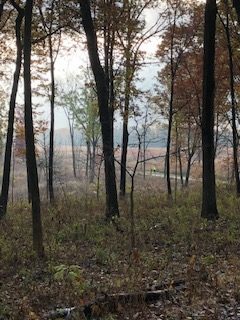
During the pandemic, many of us gave up things that would perhaps have been better not to. I kind of gave up going to church, because just “watching” church online felt exhausting and disconnected to me. And frankly, I was becoming jaded about church because of recent scandals and failures of leadership at a church I’d called home for three decades. For the last year or so, my Sunday mornings have been spent in what I call “the cathedral of the trail run,” at a local forest preserve with a few running buddies (socially distanced).
That little community of runners felt like a lifeline to me, as we ran several times a week. Running along trails as the sun rose connected me with God in a profound way. I’d given up church but not community.
We live in a deeply divided country, we’re still full of fear and suspicion of others. I wonder what I can give up during Lent to begin to change that? Can I give up trying to change people’s minds? Can I give up having to be right? Can I unclench my fists and let go of the fear, the anger, that I hold there like an addiction?
Truth be told, my base instinct is to hope to change others rather than myself. But Lent is a time of introspection, of self-examination. What is true of me? What needs to be cleaned out, let go? What, if I removed it, would create space for peace?
Rather than further deprivation, could we think of Lent as a sort of de-cluttering, a making room, spiritually speaking. During lockdowns, many of us Kondo’d our closets or even renovated our homes. We learned the value of winnowing down our stuff, of making space.
Could Lent be a time to de-clutter our souls, to make room in our hearts and minds to give attention to what matters most? When we make space, we must ask—what are we making space for? When we give up something, what will flow into that void?
I have no prescription, no three easy ways to make the most of this season. Like you, I’m often just hanging on, but I know this: talking together, reminding ourselves of what is true–it helps. So beginning on Wednesday, February 17, the first day of Lent, I hope you’ll join us. (The subscribe box is to your right, so you don’t miss a post) I’m going to make a weekly practice of writing, and hopefully, engaging in conversation around these questions:
What practices can we engage in during Lent that will heal our quarantine-weary souls? How can this season of reflection and simplicity become a time of healing?
The post Haven’t we given up enough already? Some thoughts on Lent appeared first on Keri Wyatt Kent.
November 7, 2019
Build a bigger table

I’m a planner by nature. I live in the future, where things are bright because I’ve planned every detail.
So usually by now I have begun making lists, planning how to cook the turkey. Brining or no? If so, dry brine or wet? Roast it whole or cut it up? I’m pondering side dishes, consulting my pile of back issues of Bon Appetit magazines. What wine goes with turkey and all the trimmings (answer: none, really)? Who is coming to dinner?



Our “build a bigger table” method.
I have always given great thought to the table. I love setting a pretty table, decorating it and using place cards and cloth napkins and so on. We never have a “kids’ table” but intersperse the kids among the adults. It keeps the conversation lively and often, a little more polite.
Over the years, we would literally “build a bigger table” by dragging our kitchen table into the dining room and putting it end to end with the table there. Some years, we’d add a card table to that. The table spilled over into the living room, it was chaotic and imperfect, since the tables were sometimes different heights.
We gathered family, friends, even strangers around the table. We once had a couple that my husband had met when he showed them homes, and since they were new to the area, he invited them to Thanksgiving dinner. One year, we had a refugee family join us (we’ll be doing that again this year.)

That’s kind of how we roll—we’re all about pulling up an extra chair for anyone.
But now my kids are grown and live far away. They’re coming to visit at Christmas, but won’t make it back for Thanksgiving. They haven’t been home for Thanksgiving for a few years.
Who’s at your table? Maybe distance (physical or emotional) means people who once gathered will not be there this year.
Maybe you are not hosting Thanksgiving, so you don’t need to think about cooking and details and invitations. You’re bringing wine, or pie, and that’s all you need to do.
But during this Thanksgiving season, the big day is just a day. I’m obsessing a lot less than I used to. But I am still thinking about the table. And the practice of hospitality that it represents.
During this Thanksgiving season, who needs to be invited to the table of your life? Maybe the table is one in a coffee shop, where you meet with a friend and just listen. Maybe the table is in the home of a neighbor who’s sick or struggling, where you bring them a meal. Maybe the table is in the break room at work, where you offer encouragement to a co-worker.

Photo by Tim Wright from Stocksnap.io
Today, keep your eyes open for ways you can invite someone to the table.
The post Build a bigger table appeared first on Keri Wyatt Kent.
November 6, 2019
The Thanksgiving Season has begun
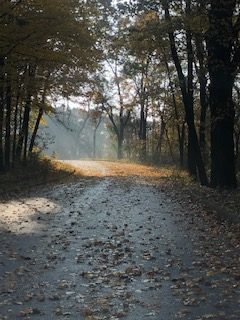
Seven weeks from today is Christmas, and what we’ve come to call “the Christmas season” will come to an abrupt end. But when does the Christmas season begin? Most people complain that it begins earlier and earlier each year. Flipping through the radio stations in the car, I’m already stumbling upon Christmas music. I immediately change the station. Too soon, friends. Too soon.
I never hear people talk about the “Thanksgiving season” in the same way, making the whole month about the day. But I’d like to do that. So I declare today that Thanksgiving season has begun. From now until November 28, it is the Thanksgiving Season, a season to give thanks. A season of gratitude. Not just one day for gratitude, but three weeks or so to notice the good and give thanks for it.

Look for beauty in the season.
I begin each day with a time of quiet and journaling. I write several lists, including one labeled “gratitude.” I try to be as specific as possible, listing ordinary but specific things. For example, last night I went to book club. This morning my list included “Friends who love to read and discuss.”

Sun rays peeking through the fall trees.
My gratitude list is not something I do out of obligation. It’s not an ought-to, it’s an opportunity. I know what gratitude builds in me. It is a spiritual practice that allows me to see more clearly the grace that infuses my life. Knowing I’m going to make the list, I keep my eyes open, looking for beauty, for small gifts in each day. Gratitude begins with noticing, with awareness. Perhaps the first step in the Thanksgiving Season is simply taking time to notice.
I’m a runner. When I practice the discipline of running, of just putting on my shoes and getting out there and moving, I’m eventually changed. I become more fit, I experience a greater ease in running. My lungs and heart are physically changed over time to be more efficient, more able to easily answer the demands of running. It also melts my stress. In essence, running helps me run. It makes me healthier, both physically and emotionally.

In the same way, gratitude helps me be more grateful. The daily practice of a gratitude list changes me. And it allows my soul to expand, to grow in its capacity to breathe in grace. If I’m gasping for more grace, I can begin to breathe easier with the practice of gratitude.
In my book GodSpace, I wrote: “When we are grateful, and give thanks, we experience grace. And that grace flows from us to people who are hungry to taste more of God.”
When gratitude transforms you, it’s not just for you—it’s for others as well. All around you are people who are hungry to taste more of God. And by simply engaging in a simple practice of gratitude, we become vessels of grace, conduits of light.
This is the season of Thanksgiving, of gratitude. Declare it. I invite you to embrace this season by making gratitude a daily practice. Feel free to share an item from your gratitude list in the comments!
The post The Thanksgiving Season has begun appeared first on Keri Wyatt Kent.
November 5, 2019
Making the holidays holy days
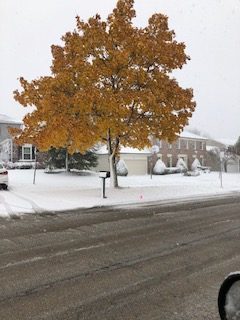

Photo by Hans Vivek from StockSnap
Maybe because it snowed on Halloween this year, I’m suddenly thinking about Christmas. Which I realized is 50 days from today. Fifty days!

I tell you that not to make you panic, but to issue an invitation.
What if the next 50 days, you could walk calm and focused? What if you decided to live with clear intentions, mindful and aware of whatever it is that God wants to say to you? What if you join us here, where you could take a deep breath each morning and remind yourself to listen to the voice that calls you beloved?
It’s been a while (okay, nine months) since I posted anything here because I’ve been writing other words, and writing words for others. My editing and publishing business, A Powerful Story, is thriving. I’m having a great time helping people turn their book dreams into reality.
But as the holidays approach, I want to slow down. I want to be intentional. Maybe you want the same thing? Yes, there is shopping and meal prep and work and family and …. And yet. Something in us longs to hear the voice of love, speaking to us in the midst of the chaos. Perhaps you too are longing for a reconnect, a simple way to make the holidays into holy days.

Thanksgiving is late this year: the first Sunday of Advent is Thanksgiving weekend. What if we opened Advent with gratitude? Instead of feeling rushed and hectic and overwhelmed, we saw this time as opportunity to lean into God’s love?
A great tool for this adventure? My book Deeply Loved. It’s a 40-day guide to experiencing the personal, unconditional, abundant love of Jesus. You’ve got time to order it now so that you can dip into it and make the 40 days leading to Christmas a time to celebrate the fact that you are, indeed, Deeply Loved.
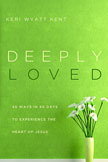
Over the next seven weeks, let’s take some time to breathe, to reflect. Stop in here to read a quick reminder of God’s love for you, and to share what we’re reading together. I’ll have excerpts from Deeply Loved, and a few from my book Listen, to encourage you.
Hit subscribe to get updates in your inbox. Order Deeply Loved here, and Listen here. Or not. You’ll get quotes and excerpts and a bit of encouragement each day over the next fifty just by stopping by here, or on my Instagram.
Leave a comment if you like: what’s your intention this holy day season? What challenges are you facing? What are you doing to care for your soul, to make the holidays holy days?
The post Making the holidays holy days appeared first on Keri Wyatt Kent.
January 25, 2019
Beef stew as self-care: winter blues help for empty nesters

This is the first in an occasional series on empty nesting, or as my friend Tim likes to call it, spacious nesting.
Outside, the soft pewter sky of winter afternoon spits down a thin, bitter snow. The frigid air is comfortless, too cold to allow flakes, let alone clumps. One online report I see notes that it is colder in Chicago today than on Mars! (I wish I were making this up.)

When my children were still living at home, this dusky afternoon hour would be full of homework and carpools and questions and interruptions. On a day like this, wintry and sharp, I’d make a stew that would warm bodies and fill the house with wonderful smells that ward off the impact of subzero windchills and beckoned us all to the table.
But my house is empty, and though my husband (and I) would appreciate stew, I’m sipping tea and thinking—why make the house fragrant with beefy comfort, when there is no one here to smell it? Except me, and I’m content with a cup of tea and the last slightly stale Trader Jo’s Peppermint Jo-Jo from Christmas which I find hiding behind a box of panko in the pantry.
They say all of us have a love language—a way we express (and receive) affection and mine is definitely cooking on both counts. But as much as my husband loves to eat, and lauds whatever I put on the table, on dismal winter days like this one, cooking tastes bittersweet.
 At each meal, I look around, bewildered. There should be more people, preferably related to me, around my table. Even after four years, it still feels off balance to have just two of us, seated adjacent, in the chairs we’ve always occupied.
At each meal, I look around, bewildered. There should be more people, preferably related to me, around my table. Even after four years, it still feels off balance to have just two of us, seated adjacent, in the chairs we’ve always occupied.
I just saw my kids over the holidays, and went skiing with daughter and son-in-law last weekend, for which I’m absolutely grateful. But now, the house feels bleak, cavernous. Though my son, my youngest, will graduate college this spring, the empty nest still feels like a new wound, not quite healed and easily reopened.
Yes, this season affords great freedom. I spent the morning working, and the afternoon at the barn: riding, visiting with friends, unhurried because there are no carpools to drive. I have come, in slow fits and starts, to appreciate setting my own schedule.
But freedom has a price, as every empty nester knows. While we’re still in it, empty still feels like the right adjective to describe my table and the nest around it.
I know, I know: I should be grateful: my kids are doing fine, on their own, independent. They’re adults, and that was the goal all along—to work myself out of a job. I can enjoy being their mom without having to do the daily chores of parenting.
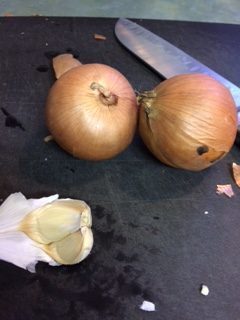 Indeed, I am free to make beef stew. To comfort and feed my self, my soul (and oh yes, my husband!). I wonder if the familiar rhythm: chop, saute’ and stir, will ease my melancholy. I consider the possibility of cooking beef stew as a form of self-care. Of soul care, even.
Indeed, I am free to make beef stew. To comfort and feed my self, my soul (and oh yes, my husband!). I wonder if the familiar rhythm: chop, saute’ and stir, will ease my melancholy. I consider the possibility of cooking beef stew as a form of self-care. Of soul care, even.
It’s 4:30, and if there is to be stew, I’d best be chopping onions.
The post Beef stew as self-care: winter blues help for empty nesters appeared first on Keri Wyatt Kent.
December 5, 2018
The surprising gift of silence

This is a loud season, full of good busy and hard questions, for most of us. Even as we strive for simplicity, we see others for whom “simplicity” is not a choice but their only option.
I see you, harried one. Drowning in to-do lists and projects, work and kids and social obligations. I see you, wanting to do something about the suffering of others, yet uncertain of how to help, and not sure how you’d find the time to do any more anyway. Feeling overwhelmed, longing for rest.
The counterintuitive truth: sometimes our most meaningful action is preceded by quiet reflection. Contemplation, pondering things in our heart, can help us to not just act, but to set our intentions in the most meaningful and helpful way.
You know that the days between now and Christmas will be full. What would happen if you carve out time to be silent and listen to God, making space for God to speak to you and guide you through this hectic season?
In that spirit, here’s an Advent post that I wrote a few years ago about the power of quiet–even quiet we may not choose.

Transformative Silence
My kids hustle out the door into the barely light morning at 6:45. I pour another cup of coffee, plug in the tree lights and sit in the dim early morning, resting in the quiet. An introvert at heart, I love silence. My to-do list beckons, but I take a few minutes to speak quietly to God, and to listen.
Silence is gift, and yet, one we don’t often recognize. In Luke’s Christmas story, the old priest Zechariah, after being told his wife will bear a son who will fulfill prophesy and prepare the way for the coming Messiah, responds with fear and doubt. Zechariah is terrified and overwhelmed when he sees the angel Gabriel standing next to the altar, and he spirals down from there when he learns he’s going to be a parent for the first time, when he was old enough to be a grandpa.
The text says:
“Zechariah said to the angel, ‘How will I know that this is so? For I am an old man, and my wife is getting on in years.’ The angel replied, ‘I am Gabriel. I stand in the presence of God, and I have been sent to speak to you and to bring you this good news. But now, because you did not believe my words, which will be fulfilled in their time, you will become mute (siōpaō) , unable to speak, until the day these things occur.’” (Luke 1:18-20, NRSV)
Because of his unbelief, God gives Zechariah a very long time-out. And like the time-outs I sometimes give my kids, it’s not just punitive, but offers a chance to think, to reflect. There are hints in the text that Zechariah was not only mute but deaf as well. The Greek word used in this passage, siōpaō , contains an element of chastisement or rebuke. It’s often used in places where people are silent because of embarrassment or consternation. It is also used to describe Jesus’ lack of response to the questioning of the high priest after his arrest. (See Matthew 26 and Mark 14).
It is used metaphorically to describe a calm, quiet sea, but only after it has been rebuked. In Mark 4, we read that Jesus, who had been sleeping during a boat ride, awakens and calms a frightful storm with a word. He tells the wind and water: “Peace (siōpaō) be still (phimoō).“ (This second word, phimoo, means to muzzle or make speechless). The New Living Translation renders Jesus’ words to the water “Quiet down!”
What affect did Zechariah’s silence have on his soul? What happened to his faith, his attitude, his heart, when he had to “quiet down” for almost a year? For more than nine months, he sat at home. After she conceived, his wife Elizabeth was “in seclusion” according to the text. Zechariah may have felt lonely, confused.
Alexander Andreyevich Ivanov [Public domain] from Wikimedia commons
What did he think about? Although he was outwardly silent, I imagine that Zechariah had many long conversations with God in those months. And gradually, something shifted within him. When he finally speaks after his son is born, what pours forth? The text says: “Immediately his mouth was opened and his tongue freed, and he began to speak, praising God” (Luke 1:64). He goes on to utter a spontaneous hymn of praise and prophesy, dictated by the Holy Spirit. (see Luke 1:67-79)
I love what Marina McCoy writes about Zechariah: “While at first glance, Gabriel’s words can seem like a punishment, we might also read them as an invitation….Sometimes our words, like Zechariah’s, manifest our own limits. Silence makes room for the fullness of God’s dynamic and healing power.” (Read her short but powerful post in its entirety here.)
In our culture, the Christmas season is often noisy. We may not see the value in times of silence or quiet. And yet, in the Christmas story is tucked a treasure of truth: silence transforms us.
Next Steps:
Carve out 15 to 30 minutes somewhere in the next day or two. Put down your phone (even turn it off!) and simply be quiet. Breathe, ask God to speak. Let your whirling mind rest.
The post The surprising gift of silence appeared first on Keri Wyatt Kent.




